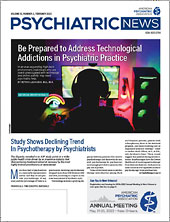People with serious mental illness die 10 to 20 years earlier than people of the same age—largely because of social determinants of health and mental health that undermine health and wellness.
For many people with serious mental illness, common social determinants are poverty, lack of access to quality health and mental health care, stigma surrounding mental illness and its treatment, discrimination, high rates of smoking and alcohol and drug use, and poor diet and exercise patterns. People of color have an especially hard time accessing care—and care that is culturally sensitive.
Interventions are beginning to emerge to overcome these barriers to health. They include medical practices that decrease the side effects of psychiatric treatments, psychoeducation to teach people how to manage health and wellness, instrumental and interpersonal supports that assist people to navigate their community, and shared decision-making that assures individuals have ultimate control over their health and wellness plan.
Research is essential for the development and evaluation of strategies to address social determinants of health and mental health as a public health imperative at all levels of government. Community-based participatory research (CBPR) is the first principle: Research meant to test concepts and interventions specific to a community needs to be steeped in that community. This does not mean people are subjects of the research but rather partners in all facets of its conduct. Investigators and members of each community as partners define hypotheses, methods, analyses, and summaries of the research and development effort. CBPR is especially notable “coming into” and “going out of” a targeted research project. “Coming in,” members of the community have fundamental insights about what needs to be examined to make sense of their problems and ways to impact them; “going out” is ownership. Researchers on the CBPR team often go on to the next research project when data are analyzed and reports written up. Community members are likely to make use of the insights to meaningfully impact their neighborhood over time. The final plan is not something developed in the ivory tower by researchers who differ from the community, but by the community itself. This kind of ownership gives credibility.
Who is community? They are people with shared experience relevant to health and wellness. Typically, CBPR focuses on diversity, especially in terms of ethnicity and religious heritage. Public health investigators also may seek to include additional communities of concern including women, LGBTQ individuals, veterans, and rural residents.
People with serious mental illness are a community worthy of CBPR. They have shared experience and similar needs vis-à-vis the health care system. Some might ask whether people with serious mental illness can capably participate in CBPR given their social and cognitive disabilities. The answer is yes, they can be vital members of the CBPR team, especially when team members provide reasonable accommodations.
This is meant to be a clarion call for psychiatrists and health care professionals of all kinds. Psychiatrists need to be mindful of the many ways they can help people with mental health challenges address their physical health needs, both within their own practice and in partnership with other health care professionals. ■


